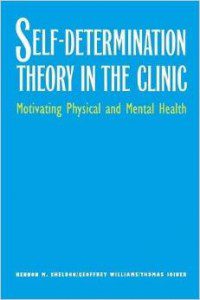 Released in April 2013, authored by SDT scholars Kennon M. Sheldon, Geoffrey Williams, and Thomas Joiner, Self-Determination Theory in the Clinic explains the ramifications of the theory and provides clinical examples to show that it can be used to motivate patients undergoing treatment for such physical or psychological issues as diabetes management, smoking cessation, post-traumatic stress, obsessive-compulsive disorder, and depression. Self-determination theory is grounded in the belief that people work best and are happiest when they feel that they are in control of their own lives.
Released in April 2013, authored by SDT scholars Kennon M. Sheldon, Geoffrey Williams, and Thomas Joiner, Self-Determination Theory in the Clinic explains the ramifications of the theory and provides clinical examples to show that it can be used to motivate patients undergoing treatment for such physical or psychological issues as diabetes management, smoking cessation, post-traumatic stress, obsessive-compulsive disorder, and depression. Self-determination theory is grounded in the belief that people work best and are happiest when they feel that they are in control of their own lives.
The first part of the book provides historical background to self-determination theory, showing that it is humanistically oriented and has three decades of empirical research behind it. In the process, the authors discuss why humanistic psychology fell out of favor in academic psychology; why “self-help” and New Age books have such perennial popularity; and why it is so important for authorities to support patients’ sense of self. The remainder of the book presents many specific case examples to describe the theory’s application.
This book can be purchased online from Yale Press